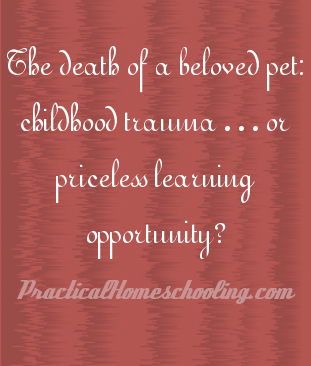Life Lessons from Pets
By Dr. Jim Kramer
Printed in Practical Homeschooling #48, 2002.
 Heard of "teachable moments"? Veterinarian and author Jim Kramer explains how even the loss of a beloved pet can lead to valuable life lessons.
Heard of "teachable moments"? Veterinarian and author Jim Kramer explains how even the loss of a beloved pet can lead to valuable life lessons.

|
 |
 Most of us like to believe that bad things are far off, remote possibilities. On some level we think that we can insulate ourselves from loss and death by not thinking about those things; by pretending they don't exist. We even go so far as to deny to ourselves and to our children that something bad has happened when we are actually faced with it.
Most of us like to believe that bad things are far off, remote possibilities. On some level we think that we can insulate ourselves from loss and death by not thinking about those things; by pretending they don't exist. We even go so far as to deny to ourselves and to our children that something bad has happened when we are actually faced with it.
Why shouldn't we act that way? As Americans, we live in a death-denying society. We are surrounded by images of products and services that help us stay young and "cheat" death. We see so many brutal images in the media each day that murder and tragedy seem inconsequential to us and to our children. Parents as well as teachers, doctors and other caregivers tend to avoid any discussion of death with children in an effort to "protect" them from a painful reality.
But how much are we really protecting a child if he or she is unprepared to deal with loss? And more importantly, how much are we protecting a child if we fail to teach them that life is a precious and fragile gift?
As a veterinarian, I am continually reminded of death. After nearly two decades of working with animals and their human companions, I have discovered some important lessons that may help children value themselves and the precious gift of life.
We understand that in order to prevent kids from taking drugs we need to approach them before they are exposed to drugs. We understand that girls are more likely to avoid teen pregnancy if parents talk to them about sex before they are faced with peer pressure to have sex. We should also understand that children will appreciate life much more when they realize that it is fragile, and that inevitably (no matter what products we purchase), it will end.
Today's children grow up with many more choices and opportunities than children of previous generations. Too often the strongest influences guiding children in decision-making are video games, movies, and television programming. Many video games, for example, are focused on shooting, beating or blowing up other human "enemies." Though game manufacturers argue that this doesn't produce killing children, it also does not contribute to understanding true fragility of a real human's life. What can we as parents possibly do to compete with the allure of these kind of special effects in order to truly reach our children with teachable moments?
Relationships with animals can help children understand that their bodies and minds are valuable, special gifts. And thought it sounds morbid, the death of an animal companion, when dealt with in a healthy, productive way, teaches children a profound lesson about appreciating friends, family, and everyday pleasures. The more deeply and profoundly a child appreciates life, the more likely he or she is to avoid choices that lead to problems like violence, drug abuse, or sexual promiscuity.
John and Ann Kapka brought home a kitten for their son Joey's seventh birthday. Joey wanted a kitten badly, and they thought feeding and caring for her would not only provide Joey with companionship, but would also teach him a sense of responsibility. Joey named his cat Fuzzy and grew to love her deeply. He did a reasonable job of caring for her needs of food, water, exercise and play. He never grew tired of Fuzzy, and she it became an important member of the Kapka family. Though Joey's parents prepared him well for meeting her needs, they did not prepare him for the fact that someday Fuzzy would die.
 One sad day Fuzzy became caught behind the wheel of the family car as Joey's father was driving to work. She was killed instantly. Joey came home from school and asked his mother what happened to Fuzzy. Wanting to protect her child Joey's mother said, "Fuzzy got sick and had to go to the doctor." She didn't realize that Joey had seen the cat still lying in the driveway.
One sad day Fuzzy became caught behind the wheel of the family car as Joey's father was driving to work. She was killed instantly. Joey came home from school and asked his mother what happened to Fuzzy. Wanting to protect her child Joey's mother said, "Fuzzy got sick and had to go to the doctor." She didn't realize that Joey had seen the cat still lying in the driveway.
Although Joey's parents love him and want the best for him, they made a mistake in their approach to Fuzzy's death. Open, guided discussions would have helped him to appreciate the happiness Fuzzy had brought to his life and to understand his feelings of sadness, anger, and guilt.
Like the Kapkas, Tom and Marie Johnson wanted to provide their children with a learning experience by bringing a puppy into their home. Their children, Alicia, 5, and Spencer, 7, immediately loved the dog and named him Blue. Blue was very happy to live with the Johnsons in the country where there were many places to run and play and two happy children to love him. Alicia and Spencer fed Blue regularly and let him sleep in their beds at night.
After four years, the family had many fond memories of Blue. They were devastated when he was injured in a fight with a coyote near their home. Tom and Marie understood that Blue's injuries were serious. They talked frankly with Alicia and Spencer about the situation. After several days in intensive care, Blue died.
During that time, Tom and Marie brought out old pictures of Blue. They and the children wrote down special stories about him. They fashioned a small grave marker for Blue in their back yard. Though Spencer and Alicia were very sad and angry, and they had a hard time understanding why their special friend had to die, Tom and Marie wanted to make sure they remembered how much fun it was to have their special friend for four years. "We wouldn't be sad if Blue hadn't been so important to us," Marie explained to the kids. Instead of trying to make Alicia and Spencer forget about Blue, the family had a party celebrating his life, watching family videos, looking at old pictures and telling their favorite stories.
Though Alicia, Spencer and their parents still had to go through the grieving process, they were able to do it together and talk openly about their feelings. The Johnsons think back happily on the time when Blue was alive, and, unlike the Kapkas, they have no regrets or unfinished business surrounding their memories. In fact, several months after Blue's death, the family agreed that while Blue could never be replaced, having a dog in their home was important. They decided to adopt a dog from the local animal shelter. Cookie, their new dog, brings the family a special happiness and appreciation for life. Blue helped them to learn to love deeply, to grieve fully, and to love again.
Gaining confidence in dealing with sadness and loss is one of the most profoundly helpful things parents could hope to provide for their children.
No one escapes life without experiencing some joy and some pain. Animal companions can add richness to life and can help teach children that life is a precious, fragile, special gift.